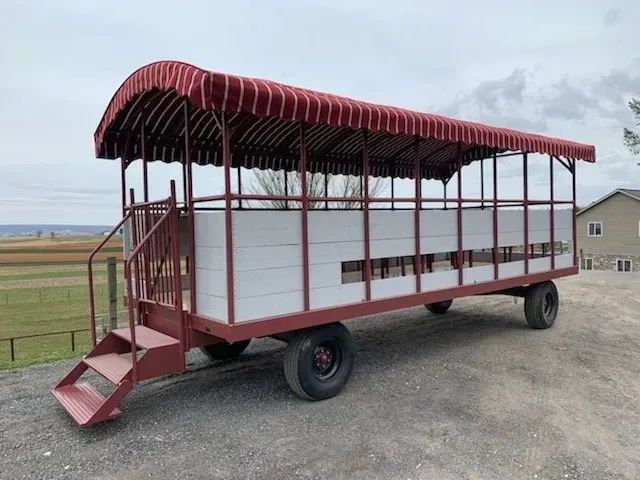
Designing a Wagon for Agritourism: What Pennsylvania Farms Should Ask
Picture a crisp fall afternoon in southeastern Pennsylvania: visitors line up at your farm, children climb aboard the wagon, and families get ready for a hayride through the fields. For guests, it’s a magical moment. For you as a farm owner, it’s the result of planning, design decisions, and investment in the right equipment.
Choosing the right agritourism wagon is about much more than looks. Safety, passenger comfort, accessibility, and durability all matter — and so does how well it fits your land and operations.
In this post, you’ll learn:
What “wagon design for agritourism” really means
The key questions every Pennsylvania farm should ask before ordering
Common mistakes and safety concerns to avoid
Quick answers to frequently asked questions
What Designing an Agritourism Wagon Really Means
Designing a wagon for agritourism use is not simply a matter of putting benches on a flatbed. It’s about aligning your wagon with your farm’s needs, terrain, and guest expectations. Below are the main elements that should guide your design decisions.
Passenger Safety and Comfort
Safety is the foundation of any wagon intended for public rides. Consider:
Rails and gates that prevent passengers from climbing or falling
Non-slip flooring to reduce risk of slips, especially in wet weather
Well-spaced seating for comfort and stability
Secure, easy-to-use entry and exit points
Capacity, Load, and Gear
Before ordering, think about the maximum number of passengers you’ll carry. This determines axle strength, wheel type, and overall weight rating. A good rule is to plan for a capacity slightly above your peak load so you are never running at full stress.
Terrain Compatibility
Pennsylvania farms can have uneven ground, steep grades, or soft soil. Make sure the wagon you choose has the right clearance, turning radius, and wheel type for your specific site.
Accessibility and Inclusivity
If your farm hosts school trips or family events, you’ll want to consider how easily guests with strollers, wheelchairs, or limited mobility can board. A ramp or modified entry design can make your experience more inclusive.
Weather Protection and Durability
In Pennsylvania, weather is unpredictable. A covered wagon with a removable canopy or tarp keeps guests comfortable and protects your wagon from the elements, extending its lifespan.
Branding and Aesthetics
Your wagon is part of your guest experience. Matching it to your farm’s look with custom paint, logos, or decorative features helps make a great impression and promotes your brand.
Maintenance and Service
Ease of maintenance is crucial for keeping your wagon in service season after season. Look for a design that allows easy replacement of flooring, rails, or tires and has parts available locally.
Key Questions to Ask Before Ordering
Before you commit to a wagon design, sit down and ask yourself a series of questions. This step will save time, money, and potential frustration later.
What is the highest passenger count I expect, and what is the weight capacity I need?
What type of ground will this wagon cover — flat, sloped, or mixed terrain?
Which entrance style works best for my operation: side, rear, or both?
Do I need accessibility features for wheelchairs or strollers now or in the future?
Will I want a canopy or weather protection system, and should it be removable?
How do I want the wagon to represent my farm’s brand visually?
Do I need a wagon that can convert between hauling and passenger use?
How will I handle routine maintenance, and do I have access to parts?
Are there any local safety codes, liability requirements, or insurance considerations I must meet?
What is my budget and timeline for delivery?
Taking the time to answer these questions ensures the wagon you order will meet your farm’s needs for years to come.
Frequently Asked Questions
What type of rails are best for passenger safety?
Rails should fully enclose the sides and rear, be tall enough to prevent falls, and have gates that latch securely.Can I convert a hauling wagon into a passenger wagon later?
It is possible, but often costly. In most cases, starting with a purpose-built passenger wagon is safer and more economical.What wheels and tires work best for muddy or uneven ground?
Choose large-diameter pneumatic tires with strong traction. Your builder can match the wheel type to your terrain.Are there safety standards for hayride wagons?
Yes. There are industry guidelines and ASTM standards that cover operation and safety. Always confirm your wagon meets or exceeds these.Do I need weather protection?
If your events run in spring and fall or during unpredictable weather, a removable cover is a smart investment.
Conclusion
Designing the right wagon for your Pennsylvania farm is about balancing safety, practicality, and guest experience. When you know the right questions to ask, you can make confident decisions that support your agritourism goals, delight your guests, and keep your operation running smoothly.
If you are ready to explore options, Gap Hill Farm Wagons can build a wagon that fits your land, your vision, and your business needs.